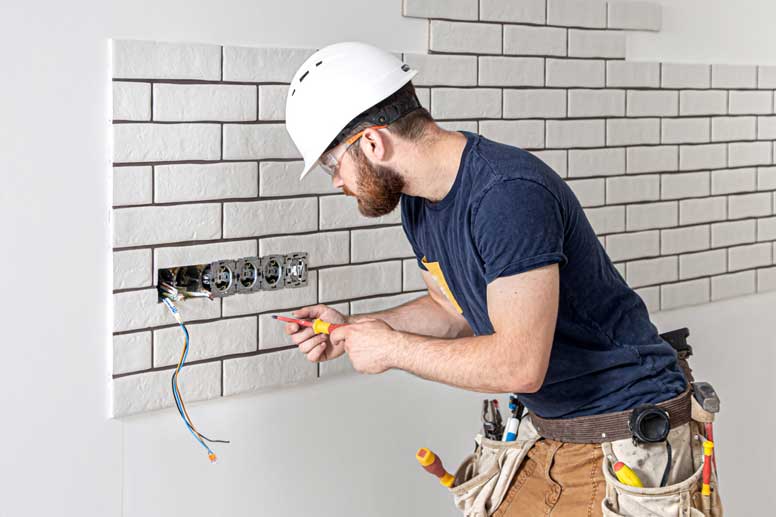How To Get Your Electrician Insurance in the United States?

This guide will walk you through everything you need to know to get the right electrician insurance for your electrical business, so you can focus on your work knowing that you’re protected.
This peace of mind allows you to focus on growing your business and achieving long-term success, while tools like our Invoice Maker simplify your billing processes.
Being an electrician is a rewarding career—you’re a skilled professional who keeps the lights on (literally!).
But let’s be honest, the job also comes with its share of risks. From wiring mishaps that could spark a fire to the occasional on-site bump or bruise, unexpected things can happen, sometimes leading to big financial and legal headaches.
That’s where electrician insurance comes in.
What is electrical insurance?
Electrical insurance, also known as electrician or electrician contractor insurance, is a specialized type of business insurance designed to protect electricians and their businesses from financial losses from work-related accidents, bodily injuries, or property damage.
It’s not a single policy but rather a combination of different coverage types tailored to the specific risks of the electrical profession.

Why is electrician liability insurance important?
Let’s talk about why electrician liability insurance is so important. It really boils down to protecting yourself and your business in a few key ways:
1. Lawsuit protection
Nobody wants to get sued, but if something goes wrong on a job and someone gets hurt or their property is damaged, expect the worst. Even if the claim isn’t valid, fighting it in court can cost a fortune. Insurance steps in to cover those legal fees, court costs, and any settlements or judgments, keeping your hard-earned money safe.
2. Getting more clients
Many clients, especially the big ones like general contractors and commercial businesses, won’t even consider hiring an electrician who isn’t insured. It’s often a requirement in their contracts. Having the right insurance makes you look professional and opens doors to bigger and better projects.
3. Staying on the right side of the law
In some areas, having certain types of insurance, like general liability or workers’ comp, is required by law for licensed electricians. Not having it can lead to fines, penalties, or even losing your license. Insurance helps you stay compliant and keep your business running smoothly.
4. Peace of mind
Perhaps most importantly, having good insurance gives you peace of mind. You can focus on doing your best work without constantly worrying about what might go wrong. It’s like having a safety net that lets you take on projects with confidence.
Who needs electrician insurance?
Who really needs electrician insurance? The short answer: pretty much anyone doing electrical work. Here’s a breakdown:
- Solo electricians (self-employed): Even if you’re a one-person operation, you’re still at risk. One small mistake can unfortunately lead to a big lawsuit, so having insurance is crucial.
- Electrical contractors: If you’re managing projects and bringing in other electrical contractors or subcontractors, you need coverage that protects you from any issues that might arise from their work as well.
- Electrical companies with employees: If you have a team working for you, workers’ compensation insurance is usually a legal requirement, and other liability coverage is essential to protect your business from potential problems.
- Apprentice electricians (sometimes): Depending on where you live and the specifics of your apprenticeship, you might need some level of insurance. It’s always a good idea to check with your program or local regulations.
Use an electrical contracting software to make your life easier when hiring electrical contractors.
What does an electrician insurance cover?
1. General liability insurance (your basic protection)
This is like your core coverage, protecting you if someone gets hurt or their property gets damaged because of your work. Imagine this: you’re wiring a new outlet, and a small electrical fire starts because of a faulty connection. General liability can help cover the costs of repairing the damage to the house, any medical bills if someone gets injured, and even your legal defense if you’re sued.
2. Professional liability insurance (protecting against mistakes)
We all make mistakes sometimes, even the most experienced electricians. Professional liability, also known as Errors and Omissions insurance, covers you if a mistake in your work causes financial harm to a client. For example, if you miswire a complex system and it damages expensive equipment, this coverage can help pay for the repairs or replacement.
3. Commercial auto insurance (for your work vehicles)
If you use a truck, van, or even your own car for business purposes, you need commercial auto insurance. Your personal car insurance likely won’t cover accidents that happen while you’re working.
4. Workers' compensation insurance (protecting your team)
If you have employees, workers’ comp is usually a must. It covers their medical expenses and lost wages if they get hurt on the job, and it also protects you from potential lawsuits related to workplace injuries.
5. Tools and Equipment Coverage (keeping your gear safe)
Your tools are your livelihood, so it’s important to protect them. This coverage, sometimes called Inland Marine insurance, covers your tools and equipment against theft, damage, or loss, whether they’re on a job site or being transported in your vehicle.
Now, while electrician insurance offers great protection, it’s not a magic shield against everything. Here are a few things it typically doesn’t cover:
6. Intentional damage and illegal activities
It’s important to understand that insurance won’t cover intentional damage, illegal activities, or anything shady like fraud or vandalism. If you intentionally damage someone’s property, you’re on your own. Insurance is designed to protect against accidents and unforeseen events, not deliberate acts of wrongdoing.
7. Damage to your own property
Unless you have a separate business property insurance policy, your own tools, office, or workshop aren’t usually covered by standard electrician liability insurance. Think of it this way: your liability insurance protects other people’s stuff, not yours. It’s important to have separate coverage for your own business assets to ensure you’re fully protected.
8. Employee injuries without workers' compensation
Furthermore, if you have employees, workers’ compensation is a must-have. If you skip it and an employee gets hurt on the job, you could be personally responsible for their medical bills and lost wages—a very expensive and risky situation. Workers’ compensation is not only often legally required but also provides crucial protection for both your employees and your business.
9. Highly specialized electrical work
Finally, some really specialized electrical work, like high-voltage power lines or hazardous environments, might need extra coverage or a completely separate policy. It’s always best to check with your insurance provider if you’re doing anything outside the norm. These specialized jobs carry higher risks, and your standard policy might not adequately cover them.

What will electrician insurance cost me?
When it comes to electrician insurance costs, there’s no single answer. The price you pay will depend on a few things.
Type and amount of coverage
First off, the type and amount of coverage you choose is a big factor. Naturally, more comprehensive coverage will cost more.
This means that if you opt for higher liability limits (the maximum amount the insurance company will pay out for a covered claim) or add extra protections like professional liability (which covers mistakes in your work) or tool and equipment coverage (which protects your valuable tools), you’ll pay a higher premium.
Business size
The size of your business is another key consideration. A large company with multiple employees and a substantial revenue stream will typically pay more than a self-employed electrician working solo.
This is because larger businesses have more employees who could potentially get injured, and they often undertake larger, more complex projects with greater potential for liability.
Location
Where you’re located also plays a role, as insurance rates can vary significantly from one state or city to another due to local regulations and risk factors.
For example, areas with higher rates of property crime might have higher premiums for tool and equipment coverage, while areas prone to natural disasters might have higher premiums for property damage coverage.
Claims history and experience
Your past claims history is also taken into account. If you’ve filed claims in the past, you’ll likely see higher premiums, as insurance companies see you as a higher risk.
Conversely, if you’re an experienced electrician with a good track record and relevant certifications, you might be eligible for lower rates. This shows insurers that you’re a responsible professional who takes safety seriously.
The importance of shopping around
That’s why it’s so important to shop around and compare quotes from different insurance providers to find the best deal.
Each insurance company has its own way of calculating risk and setting prices, so comparing quotes is the best way to ensure you’re getting the right coverage at a competitive price.
What types of electrician insurance exist beyond the basics?
While the core coverages we’ve covered are essential, there are other types of insurance that electricians should consider to further safeguard their businesses:
1. The business owner's policy (BOP)
A Business Owner’s Policy, or BOP, is a great option for many small business owners, including electricians. It combines several important coverages into a single, often more cost-effective package.
Typically, a BOP includes general liability insurance, commercial property insurance (which protects your business building and its contents), and business interruption insurance (which helps cover lost income if your business is temporarily shut down due to a covered event, like a fire or storm).
2. Protecting your tools on the go
We touched on this earlier, but it’s worth reiterating: Inland Marine insurance is vital for protecting your tools and equipment while they’re being transported. Whether you’re driving to a job site or storing your equipment in your vehicle overnight, this coverage protects against theft, damage, or loss.
3. Guaranteeing your work
Surety bonds are a bit different from traditional insurance policies. They act as a guarantee to your clients that you’ll complete the work as agreed upon in your contract.
If you fail to complete the job, the bond provides financial compensation to the client. These are often required for public works projects and sometimes for private contracts as well.

How to get your electrician insurance in a nutshell
Getting the right insurance for your electrical business doesn’t have to be complicated. Here’s a step-by-step guide:
1. Assess your needs
First, take some time to figure out exactly what you need. Think about the kind of work you do, the types of projects you take on, and any specific risks that are unique to your business. This will help you determine the right types and amounts of coverage.
2. Research insurance providers
Next, do some research on insurance providers. Look for companies that have experience insuring electricians and contractors. Check their financial ratings to make sure they’re financially stable, and look for reviews or testimonials about their customer service.
3. Get quotes
Then, it’s time to get quotes. Contact several different insurance companies and provide them with accurate information about your business, such as your experience, revenue, number of employees, and any past claims. This will help them give you accurate quotes.
4. Compare policies
Once you have a few quotes, compare them carefully. Don’t just focus on the price; make sure you understand what each policy covers and what it doesn’t. Pay attention to the fine print and make sure you understand the terms and conditions.
5. Choose a policy and purchase coverage
Finally, choose the policy that best meets your needs and budget. Remember, the cheapest option isn’t always the best. Consider the overall value and the insurer’s reputation.
The wrap-up
With the right electrician insurance in place, you can work with confidence, knowing that you’re protected from a wide range of potential risks.
By taking the time to understand your coverage needs and following the steps in this guide, you gain valuable peace of mind, knowing that your business is shielded from potentially devastating financial losses and that you’re operating within legal requirements.
This peace of mind allows you to focus on growing your business and achieving long-term success.

Sarah Shaar is a SEO Content Writer born in Lebanon, and studied at the Lebanese American University.
With a background in journalism and a Master's in Digital Marketing, Sarah thrives in adapting to various copywriting disciplines.
Her passion lies in crafting creative and compelling content that speaks directly to her audiences.



